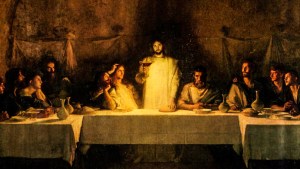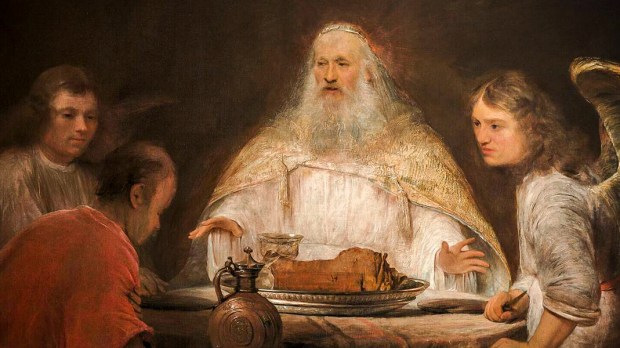Saint Benedict of Nursia is customarily considered the father of Western monasticism. This is not to say that he was the first Christian monk. That title often goes to Anthony the Great, credited with starting the tradition. Monastic, eremitic Christian life was born in the Egyptian desert at least two centuries before Benedict, around the year 270. Whereas it was Paul of Thebes who first ventured into the desert, it was Anthony who made it a movement. Those who followed him soon formed a kind of alternate Christian society — the famous “Desert Fathers.” One of these Fathers, Saint Pachomius, organized the first Christian monastic communities under the authority of a figure known as an “abbot” —a word derived from the Aramaic “abba,” father.
This means Benedict’s famous Regula is not the first monastic rule. Saint Basil of Caesarea’s Asketica —an ethical manual aiming to organize the life in the cloister, still used today in the Eastern Orthodox Church— is considered to be the first of its kind. But the earlier Pachomius already had one. However, his is not necessarily what one might expect from this kind of texts. Instead of providing monks with a detailed instruction on how to organize their daily lives, Pachomius’ rule is basically comprised of prayers that the members of the community could learn by heart and repeat throughout the day. It is clearly inspired by the classic Pauline mandate found in 1 Thessalonians, “pray without ceasing.” (Cf. 1 Ts 5, 16-18). The famous Rule of Saint Benedict, in comparison, is definitely exhaustive. It is a whole book of precepts and instructions, organized in 73 chapters. It has been used uninterruptedly by Benedictine months since the sixth century.
One of the most famous passages of Benedict’s rule is Chapter 53. The text is relatively brief but, in spite of its brevity, it is by far the most famous and influential part of the whole Rule. In just a few lines, it summarizes the main principle of the legendary Benedictine hospitality. It reads as follows:
Let all guests who arrive be received like Christ, for He is going to say, “I came as a guest, and you received Me” (Matt 25, 35).
It is understandable that monastic communities take hospitality to be at the very core of their mission and identity, especially if in the desert or other relatively isolated areas, where monasteries are often found —travelers wandering around these particularly remote regions could use all the help they could get. Christian charity would compel monks to lend a helping hand. This tradition is still preserved and honored today.
But hospitality is not a monastic invention. It is rather a thoroughly biblical value. It might be even said to be at the core of Scripture. In fact, some read the very beginning of the book of Genesis as the definitive, exemplary gesture of hospitality —God creates a whole world for human beings to live in, and tends to their every need. Quite the host.
Genesis 18 echoes this gesture. It tells the story of Abraham and Sarah’s generous hospitality to three visitors who came to them by the oaks of Mamre. Seminomadic life would often bring people from different families and regions into contact with one another, Canaan being part of a natural land bridge between Asia and Africa and, consequently, a popular trade route. In the absence of a formal industry of hospitality, which would only develop later (and would reach one of its peaks with Benedictine hospitality, precisely) people living in cities, villages, small towns, and even encampments had a social obligation to welcome strangers. The text reads:
The Lord appeared to Abraham near the great trees of Mamre while he was sitting at the entrance to his tent in the heat of the day. Abraham looked up and saw three men standing nearby. When he saw them, he hurried from the entrance of his tent to meet them and bowed low to the ground. He said, “If I have found favor in your eyes, my lord, do not pass your servant by. Let a little water be brought, and then you may all wash your feet and rest under this tree. Let me get you something to eat, so you can be refreshed and then go on your way—now that you have come to your servant.” “Very well,” they answered, “do as you say.” So Abraham hurried into the tent to Sarah. “Quick,” he said, “get three sheaths of the finest flour and knead it and bake some bread.” Then he ran to the herd and selected a choice, tender calf and gave it to a servant, who hurried to prepare it. He then brought some curds and milk and the calf that had been prepared, and set these before them. While they ate, he stood near them under a tree. “Where is your wife Sarah?” they asked him. “There, in the tent,” he said. Then one of them said, “I will surely return to you about this time next year, and Sarah your wife will have a son.”
Tradition understands this passage to mean (among many other things) that were it not for their hospitality, Abraham and Sarah would have never had any children. It is only because they receive these strangers in their house that they also receive the blessing of having Isaac. They have mirrored God’s initial, hospitable, literally creative gesture.

But there is even more to the book of Genesis on this subject. After the angels received the hospitality of Abraham and Sarah, the Lord told Abraham that “the outcry against Sodom and Gomorrah is so great and their sin so grievous that I will go down and see if what they have done is as bad as the outcry that has reached me. If not, I will know.” (Cf. Gen 18, 20). Abraham immediately inquired the Lord if he would spare the city if 50 righteous people were found in it. God agreed he would not destroy it, for the sake of the righteous living there. Abraham bargains, asking God for mercy at lower numbers: first 45, then 40, then 30, then 20, and finally at 10. The Lord agreed each time. He sent two angels (not the three we saw staying in Abraham’s tent) were sent to Sodom to investigate.
Lot, Abraham’s nephew living in Sodom, receives these strangers. Like Abraham, he invites them to spend the night in his house, serves them, feeds them, and gives them shelter. Other Sodomites wanted Lot to hand them overinstead. But rather than handing over his guests, Lot offered them his two daughters instead. He was refused.

By the morning, the two angels urged him to get his family and flee the city, which was about to be destroyed: “Flee for your life! Do not look behind you, nor stop anywhere in the plain; flee to the hills, lest you be swept away!” The rest of the story, we already know. Lot’s wife disobeys, looks behind, to the city, and immediately turns into a pillar of salt.And salt has a lot to do with hospitality.
Salt plays an interesting, often contradictory role in the Bible. It was widely and variably used symbolically in ancient Israel. The books of Numbers and 2 Chronicles present salt as the symbol that confirms friendship between parties. Eating salt together, in fact, was (and still is) a sign of friendship in some regions in the Mediterranean.
According to tradition, Lot’s wife was a Sodomite herself. That would mean hospitality was not part of her customs. Some sources claim that when Lot asked her to bring salt to his guests, she complained: “Also this evil custom you wish to introduce into this place?” (Cf. Midrash Agadah, Bereishit 19, 32). As they had no salt in the house, she went door to door asking neighbors for some, letting them know her husband had ignored the laws of the city: he had invited strangers in. The Midrash then explains that having sinned with salt, “she was punished with salt.”
This “punishment” is indeed telling. A land covered with salt, in the Bible, is also a metaphor for no man’s land, a desolated land, a land in which nothing grows (Cf. Psalms 107:34; Job 39:6; Jeremiah 17:6). Since it was hospitality what allowed Abraham and Sarah to have a son, grow, and prosper, by the same logic those who deny hospitality (not only Lot’s wife, but the entire city of Sodom) would turn into a wasteland.


